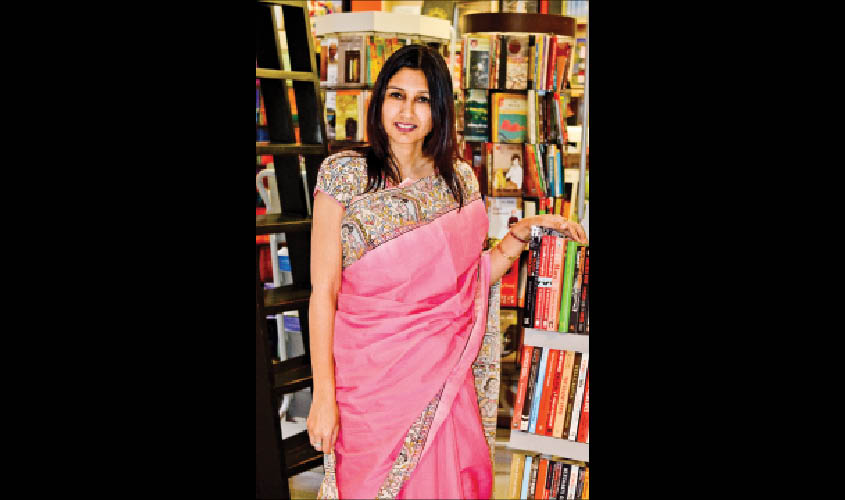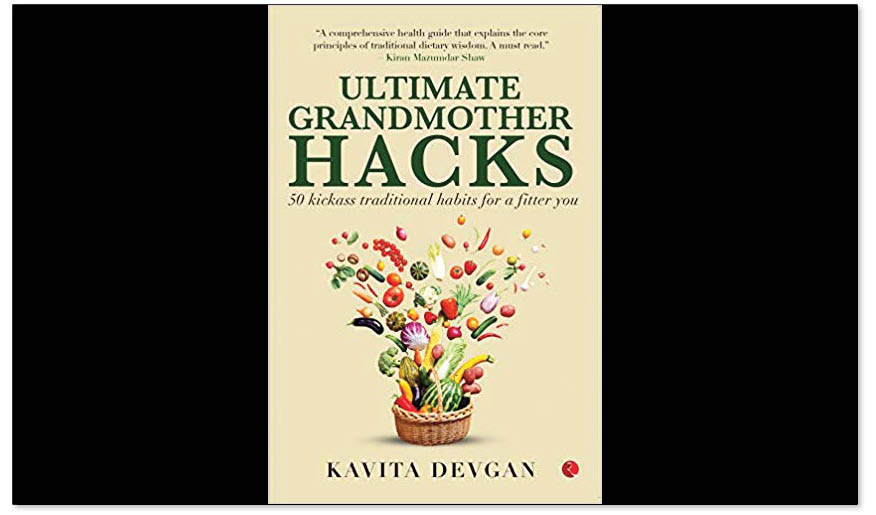Grandma’s remedies may be derided by the scientifically-minded naysayers, but according to a new book by Kavita Devgan, our tradition has a lot to teach us about healthy living, writes Utpal Kumar.
While reading Kavita Devgan’s book, Ultimate Grandmother Hacks: 50 Kickass Traditional Habits for a Fitter You, the mind floats to two different personalities, completely unrelated and distant by centuries if not millennia. The first one is sage Charaka, father of Ayurveda, who, when he finished his studies in a gurukul, was asked by his teacher to go to the forest and collect some medicinal plants for him. The young Charaka didn’t return soon, but when he did he wasn’t carrying anything. “So, there isn’t anything worthwhile in this forest?” To this, he replied, “Master, I came back empty-handed because there were so many. I found each plant in the forest having some medicinal value or the other.”
The other person is my mother (and not the grandmom, as Devgan invokes in the book). She had, all through my childhood, effectively kept tablets and capsules out of the household, especially for common, day-to-day ailments. I would complain about having a cold, and she would be ready with kaadhaa. When my body ached with fever, a glass of milk sprinkled with turmeric was served immediately. And for pimples, neem leaves would readily come to my rescue.
Flipping through the pages of Ultimate Grandmother Hacks, I realised the observations and remedies of the two weren’t just based on some ancient, obscurantist idiosyncrasies but our age-old, lively interaction with nature. A phenomenon which saved the “savage” tribesmen of the Andaman and Nicobar islands during the 2004 tsunami when they intuitively reached out for higher places, but perished the educated and well-travelled “modern” individuals!
A regular contributor in newspapers and journals and author of several books, Devgan is a well-known health expert and nutritionist in the country. So, when she tells us that the worldview of our grandmothers was not just based on some stupid, mindless rituals but a rational, effective and scientific approach devised after constant interaction with—and observation of—nature, then the naysayers in us, sniggering at anything and everything traditional, get a serious beating. While reminding how our elders would insist on having dinner early in the evening, sitting with other family members on the floor with feet duly folded, Devgan explains eating in a near-Padmasana pose not just helps in better digestion but also improves the person’s skeletal-muscular health.
Our grandmothers didn’t tell the reasons behind such diktats, but science today confirms that people eat better when they share a meal with others. “They tend to eat more fruits and vegetables and other nutrient-rich foods. And also that younger kids who eat dinner with their families are less likely to be overweight than children who don’t,” she adds.

The author credits her mother for instilling in her respect for traditional ways/rules of eating. “Whether you understand them or not, follow them; they are fool-proof,” Devgan recalls her mother as saying. Researchers in the West are now proving what was already known to our ancestors. She writes, “I now have the answer to why a little bit of ghee (clarified butter) on the phulka (flat bread) is good for me, why drinking water first thing in the morning is such a good idea…and why raw onions and green chillies were served at both lunch and dinner. There are many old diktats that are yet to be substantiated, but I am sure it is only a matter of time.”
The book is divided into two parts. The first has 30 chapters, each talking about an age-old habit that we can fit into the contemporary world to help us come out of the unhealthy trapping of our “modern” lifestyles. The book begins with a chapter on the traditional practice of starting a day with freshly-squeezed half-lemon in warm water, which scientists say is the best way to restore acid-alkali balance of the gut. It is followed by other chapters, asking us to “make friends with fat”, reminding how removal of ghee from our diet has increased the risk of dementia among Indians; advising us to detoxify naturally by fasting once a week, like the good, old days of our grandparents; and, asking us not to be wary of having a “milk moustache”!
The beauty of the book is that each chapter is independent of the other and can be read in any order. Also, what makes the book engaging, interactive and reader-friendly is a three-month-long calendar, giving easy-to-follow steps, recipes of vegetables that one can easily make at home, among others. Never once does the author ask us to go for extreme measures, and even provides a “cheat sheet” to add fun to our health regimen. “It is a fact that the more you try to run away from meetha, the more you will think about it and crave for it. Instead, learn to get smart about it and eat wisely. I wonder if that’s why a small portion of a dessert was always a part of our traditional thali,” she says.
Ultimately, as Devgan writes in the book, for good health we must not just follow what our grandmothers told us to eat but also what they actually ate. To validate her point, she quotes biological anthropologist Stephen Le’s findings, saying our optimal diet is what our ancestors ate, not what the ancestors of another ethnic region did. This, according to Le, is what our body needs even today to keep diseases away. Does this not explain why our kids are suddenly turning obese, we are becoming the capital of heart diseases, and lifestyle problems are taking epidemic proportions in the country?
Ultimate Grandmother Hacks is an ultimate reminder of where we have gone wrong. Thankfully, the treatment isn’t arbitrarily exotic and expansive. Just turn traditional, says Devgan, and the health battle is won.

